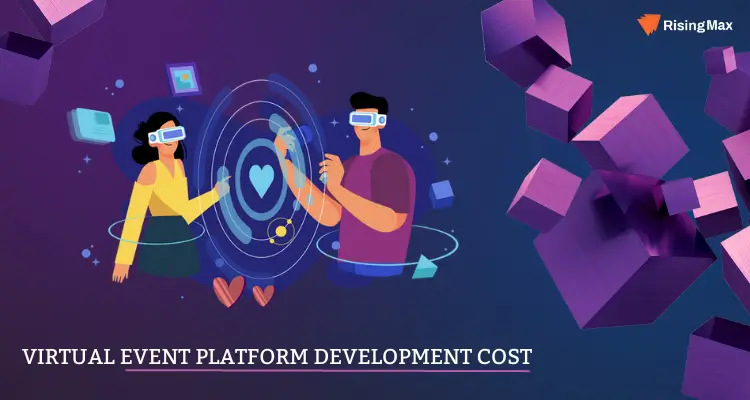Creating a virtual event platform is a transformative endeavor that bridges physical gaps, allowing organizations to engage a global audience seamlessly. The cost of developing such a platform varies widely and is influenced by numerous factors. These encompass the platform’s complexity, features, scalability, and customization.
Basic virtual event platforms can be cost-effective, with prices starting around $50,000, offering standard functionalities like video streaming and chat. However, as requirements grow more intricate—demanding features such as virtual exhibitor booths, interactive sessions, and analytics—the cost can rise significantly, reaching six or seven figures. It’s crucial to align your budget with your objectives and prioritize features for a tailored and cost-effective solution.

What Is A Virtual Event Platform?
A virtual event platform is a comprehensive digital solution designed to replicate and enhance the experience of physical gatherings in an online environment. It is a versatile hub for hosting a wide range of events, such as conferences, trade shows, webinars, and social gatherings, allowing participants to connect, collaborate, and engage remotely. These platforms leverage cutting-edge technologies to provide features like live streaming, interactive chat, virtual booths, and audience engagement tools.
Virtual event platforms have gained immense popularity due to their ability to break down geographical barriers, reduce costs associated with physical events, and provide a convenient and flexible way for attendees to access content and network from the comfort of their own devices. With the potential for global reach and the capacity to collect valuable data and insights, virtual event platforms have become a vital tool for organizations looking to connect with their audiences in an increasingly digital world.
The average cost to develop a virtual event platform can be between $50,000 to $120,000. It also depends on various other factors, including the size of the company, the location of the app development company, and multiple other things. We will also discuss the development cost in detail below before that, let’s know more about the virtual event platform.
Also Read: AR VR App Development
Features Of Virtual Event Platform
For a successful event, a virtual event platform must have the following features.
Interactive Chat and Networking
Virtual event platforms offer real-time chat functionality, enabling attendees to connect with speakers, exhibitors, and other participants. This fosters engagement, facilitates networking, and encourages discussions, replicating the social aspect of physical events in the digital realm.
Live Streaming
The ability to broadcast live sessions and presentations is a cornerstone feature. Attendees can access content in real time, ask questions, and engage with speakers, making it an essential component for virtual conferences and webinars.
Virtual Exhibitor Booths
These digital spaces allow sponsors and exhibitors to showcase products, services, and resources. Attendees can explore virtual booths, interact with representatives, and access exclusive content, enhancing the exhibition experience.
Audience Engagement
Gamification, polls, surveys, and Q&A sessions keep participants engaged and active throughout the event. These tools make learning interactive and fun, increasing attendee satisfaction and knowledge retention.
Content Libraries
Virtual event platforms typically include a repository for storing event materials such as presentations, documents, and recordings. Attendees can revisit content at their convenience, extending the event’s value.
Analytics and Insights
Robust data analytics provide event organizers with valuable insights into attendee behavior, engagement levels, and content preferences. This data informs future event planning and marketing strategies.
Customization and Branding
Event organizers can tailor the platform’s appearance to align with their branding, creating a cohesive and immersive experience. Customization options help maintain brand consistency and recognition.
Security and Privacy Controls
Virtual events often handle sensitive information. Robust security features protect data, ensure compliance with privacy regulations, and create a safe environment for attendees and organizers.
Integration Capabilities
Seamless integration with other software and tools, such as CRM systems and marketing platforms, streamlines event management and enhances the overall event experience. This feature maximizes efficiency and data synchronization.
Elevate Your Virtual Events With High End App
Ready to create unforgettable virtual experiences? Partner with our expert virtual event platform development team to craft a custom solution that will engage your audience like never before. Let’s turn your vision into reality!
Why Virtual Event Platform Development Is Beneficial For Business?
The virtual event platform opens the door for the global audience and helps the platform grow globally. On the virtual event platform, you can organize multiple events at a time for all genres without any chaos. Here are a few reasons to get into the event management business and build a high-end virtual event platform.
Decentralization
The virtual event platform gives flexibility to organize multiple events at a time and without going on the field. When the world is looking toward decentralization, providing a decentralized option for the user will help to do maximum business with minimum effort.
New Business Model
Opting for virtual event platforms when organizing conferences and trade shows offers significant cost advantages over traditional offline events. By eliminating expenses like venue rentals, stage setups, and expensive equipment, event organizers gain the flexibility to allocate resources more strategically.
Hybrid
The future outlook embraces a hybrid model wherein, as offline events regain safety, organizers seamlessly merge live and virtual elements. The landscape of live video streaming technology is evolving rapidly, prioritizing immersive event experiences, enhanced networking opportunities, and seamless integrations with sales and marketing tools.
Cost-Efficiency
Traditional in-person events involve substantial costs for venues, travel, accommodation, and physical infrastructure. Virtual event platforms significantly reduce these expenses, making events more budget-friendly.
Customization
Event organizers can tailor virtual platforms to align with their branding and specific event requirements. This flexibility ensures a consistent and immersive user experience.
Reduced Environmental Impact
By eliminating the need for physical travel and infrastructure, virtual events contribute to a reduced carbon footprint, aligning with sustainability goals.
Content Preservation
Virtual event platforms archive content, making it accessible post-event. Attendees can revisit sessions and resources, extending the event’s value over time.
Enhanced Networking
Virtual events offer various networking tools, including chat rooms, breakout sessions, and one-on-one meetings, fostering meaningful connections among participants.
Scalability
Virtual event platforms can accommodate both small and large audiences effortlessly, making them adaptable to various event sizes and types.
Lower Entry Barriers
Virtual events often have lower registration fees or are free, making them accessible to a more diverse audience, including students, startups, and individuals with limited budgets.
Also Read: Virtual Awards Ceremony Platform
Virtual Event Platform Development Cost (Approx)
Here is the table with the approx development cost of virtual event platform:
| Designing Cost | 10k to 20k |
| Cost For Outsource Software | 35k to 65k |
| Cost Of Deployment | $15k |
| Cost Of Integration | $10k |
| Cost For Maintenance | $1500 to $4k |
| Cost For Hiring Project Manager | $25-$49/hr |
| Quality Assurance Team And Testers | $5k |
The prices mentioned above are the approximate fees to build a virtual event platform; they may differ from the prices mentioned above according to the demand for the features, usage of advanced technologies, languages, etc.
Virtual Event Platform Development Cost (As Per The Size Of The Company)
The company’s size also affects the development cost of a virtual event platform. Here is the an approximate cost:
| Company Size | Cost | Manpower |
| Small Size Company | $20,000 to $ 45,000 | 50-200 |
| Mid Size Company | $50,000 to $1,00,000 | 200-1000 |
| Large Size Company | $100,000 to $1,500,000 | 1000-10,000 |
Pros & Cons (As Per The Size Of The Company)
Small-Sized Company
Typically, small-sized companies employ a workforce ranging from 10 to 50 employees. Opting for a small company can be a prudent choice when working with limited project budgets. Small firms excel in providing individualized attention to projects, striving for impeccable delivery. However, potential downsides include juggling multiple projects concurrently, which may lead to project delays and risks for established businesses or startups.
Small Size Companies’ Pros And Cons
| Pros | Cons |
| Cost-Effective | Unexperienced Developers |
| Instant Action On The Project | Project Delay |
| Attention | Cannot Compete On Price |
Medium-Sized Company
Medium-sized companies strike a harmonious balance between the extremes. They boast experienced teams comprising developers, designers, project managers, and QA experts, all while offering cost-effective development rates. Opting for a medium-sized company can be a good choice for partnering in the development of a virtual event platform.
Mid-Size Companies’ Pros And Cons
| Pros | Cons |
| High-End Technical Team | May Add Extra Charges For Additional Features |
| Individual Project Managers | May Delay Delivery in Case Of Additional Features |
| Cost-Effective Development Rates | – |
Big-Sized Company
Larger enterprises unquestionably offer extensive capabilities and often surpass expectations. Yet, the drawback of engaging with big companies lies in their higher development costs. Well-established businesses might accommodate the expense, but for startups, the financial challenge can be formidable, particularly when considering projects.
Big-Size Companies’ Pros And Cons
| Pros | Cons |
| High-End Technical Team | High Development Rates |
| Individual Project Managers | Project Delay |
| After Delivery Service | Additional Charges |
Another thing that affects the virtual event platform cost is the location of the company that you will hire for the virtual event platform development.
Virtual Event Platform Development Cost (Location Of The Company)
| Region | Hourly Costs |
| North America | $25-$75 |
| Europe | $50-$100 |
| Gulf Countries | $70-$120 |
| Asia | $25-$49 |
To develop a highly advanced virtual event platform can cost between $50,000 to $150,000. It can be more or less according to the market demands and the requirements of features.
Don’t miss out on the power of virtual events. Join forces with our top-notch development company to build a cutting-edge virtual event platform.
Conclusion
The cost of virtual event platform development is a multifaceted consideration. It depends on various factors, such as the platform’s complexity, features, customization, and scalability. While basic solutions may be cost-effective, more advanced platforms with sophisticated features can entail a significant investment.
The key is aligning your budget with your specific objectives. Investing wisely in virtual event platform development can lead to substantial savings compared to traditional in-person events, with the added benefit of broader reach and accessibility. By carefully assessing your requirements and partnering with the development team of RisingMax Inc., you can get a virtual event platform that meets your needs and delivers a strong return on investment while providing valuable experiences for your audience.














